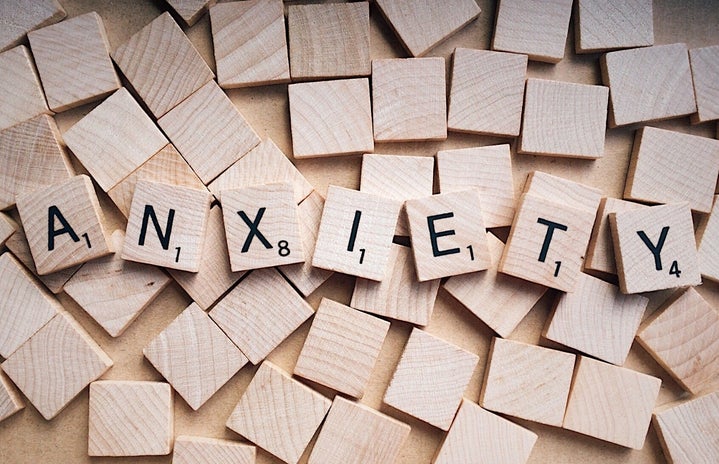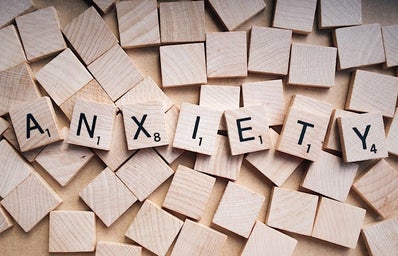When I refer to anxiety, I don’t mean momentarily stressing out during speeches or getting the nervous jitters on a first date. The American Psychological Association defines anxiety as “an emotion characterized by feelings of tension, worried thoughts and physical changes like increased blood pressure.” For many, anxiety is an all-consuming feeling of fear, hopelessness, and despair that never goes away and impacts how we function in our day-to-day lives. Anxiety has the power to impact your physical health just as equally as your mental health, and many symptoms manifest in the body, such as painful headaches, muscle cramping, increased heart rate, nausea, and feelings of numbness. Oftentimes, these physical symptoms can be so frightening that they cause anxiety to worsen. Anxiety is very complex and understanding how it looks in your own body takes patience, time, and experience; it’s not a straight-forward or simple concept to comprehend. For instance, many people use the terms “anxiety attack” and “panic attack” interchangeably, however they are two different situations with some overlapping symptoms. We may assume that we struggle with anxiety, but it can be scary seeking out medical help, and not everyone has access to these services, so it can be hard to truly understand what we’re dealing with.
I didn’t truly understand my anxiety until I was 20, but the symptoms I had experienced in the years before that were clear indicators of it. One of the most important lessons I learned as I began to accept my anxiety is that as much as I felt like it, I’m not alone. In fact, millions of people deal with similar struggles pertaining to anxiety every day. While medications and therapy are really good options, it is also possible to manage anxiety through self-care, or a combination of both.
Here are some of the best ways I’ve found through my experiences that help alleviate my symptoms of anxiety, both mentally and psychically:
- Practice Mindfulness
-
If there has been anything that has helped me to deal with my anxiety, it’s mindfulness. But what even is it? In my perspective, practicing mindfulness is being aware of intrusive, obsessive thoughts that take over your brain and are the root cause of anxiousness. Try to acknowledge those thoughts of fear, worry, embarrassment, etc., and then simply let them go. This sounds complicated, and it can be difficult, but the more you do it, the easier it gets. Mindfulness techniques to try include meditation, journaling, and my favorite, maintaining a present state of mind. There is only right now – the past is gone, and the future is not yet here. I find that living moment to moment prevents me from worrying about events that have already occurred, or stressing over the hours, days, and years ahead of me. There is no point of dwelling on the past or anticipating an unknown future; all of that is made up in your mind, and your anxiety is telling you that it’s real. By being mindful and allowing the present moment to occupy all the space inside your head, there is no leftover room for anxious thoughts.
- Maintain a Well-Rounded, Healthy Lifestyle
-
Eating well and seeking out a well-balanced diet will make all the difference in how you feel mentally. In fact, consuming things like alcohol and caffeine have been proven to make anxiety worse. It is also important to rest when you need to, and to try to get an adequate amount of sleep each night by following a sleep pattern. Upsetting your circadian rhythms by being on your phone too late at night or staying up due to sleeping in very late in the morning can worsen anxiousness. Try to stay consistent with your sleep schedule and pay attention to the time. Being active has many physical benefits for your physical health as well, but it can also improve your mental state. Chemically, working out pumps endorphins through your body, which essentially make you instantly happier. Taking care of your body can make you feel better about yourself overall. Exercising also makes it very difficult for intrusive thoughts to creep in because you don’t have extra energy to spend or time to delegate to them when you are focused on your run, walk, weight-lifting session, etc. Getting your sweat on will occupy your brain and help you become present with whatever workout routine you do. It doesn’t have to be high intensity, as long as you’re getting a change of scenery and moving your body at least once a day.
- Spend Time with Family & Friends
-
Many times, anxiety makes us feel isolated, guilty or as if we’re a burden, and ultimately like we’re all alone in the world. Remember that this is NOT true! There is always someone to reach out to for help, or even just to talk to. Surrounding yourself with your loved ones will help remind you how important you are to someone else, that you are much bigger than your mental health issues, and that you are strong enough to overcome them. Having a support system is essential to healing and improving when it comes to anxiety. Share a meal, watch a movie, or even just sit in the same room as a friend or family member. Having another person’s presence can be comforting and help you feel safer from those intrusive thoughts and fears that anxiety brings. Chances are, that person has had similar struggles to you and it’s always nice to be able to talk things out to someone, or even to just lend an ear and listen to them to gain new ideas and perspective on how to tackle your anxiety.
- Unwind by Disconnecting
-
If you are ever experiencing a bout of anxiety that just won’t seem to go away, take deep breaths. I know this sounds cliche, but practicing breathing techniques is a very effective way of calming yourself down and regulating your body’s fight or flight response and slowing a racing heart. I like to count to seven as I inhale, and then again as I exhale. Also, try disconnecting from social media, and remember to always take breaks when you need to. You will be much less productive and much more anxious if you don’t allow yourself to rest when you need to. Relaxing can be really difficult because you feel like by doing “nothing” you are being unproductive, when in reality doing nothing is something; it’s necessary for your well-being and to allow your mind and body to tackle another day. This pulls you back into the moment and removes those intrusive thoughts by having you focus solely on how many breaths you’re taking, and not whatever it was you were worrying about. The unknown is what we cannot control, and what we cannot control scares us, thus amplifying our anxiety. However, your own breathing is always in your control.
- Release All Expectations of Yourself & Others
-
The second you stop comparing yourself to others, holding yourself to society’s standards, and wishing you were different, then you will have much less to worry about and much less chance of anxiety taking over. But, this is easier said than done. Remember, no one is perfect, and anxiety does not make you broken. And remember that everyone’s social media accounts tend to be the highlights of their life, and don’t represent their day-to-day; you do not need to be “more together” or “more popular” or “more ‘like them’” to be yourself – nobody is perfect, regardless of how their body looks or how many followers they have. Going through challenges of understanding the complex parts of modern society – this is why we often dream of simpler times – helps us to grow stronger and discover important things about ourselves we wouldn’t have otherwise. Take it easy on yourself, be kind to your mind and body, and don’t let fabricated expectations make you afraid to live your truth and be yourself.
Mental health struggles are normal, and you will get through them no matter how impossible they seem right now; baby steps.


